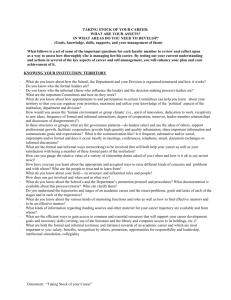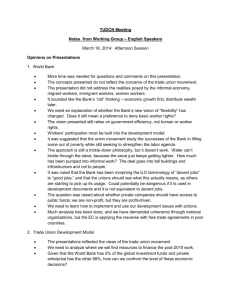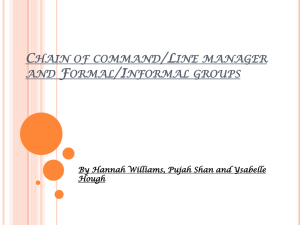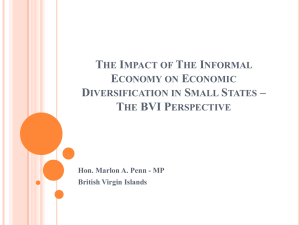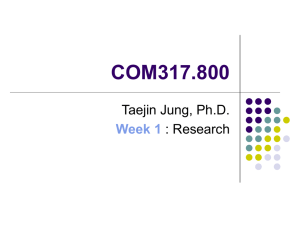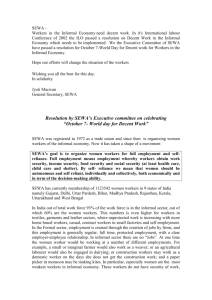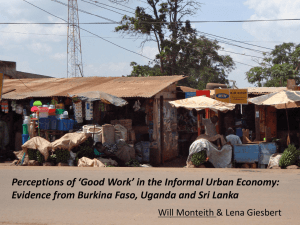Lunchtime Briefing
advertisement
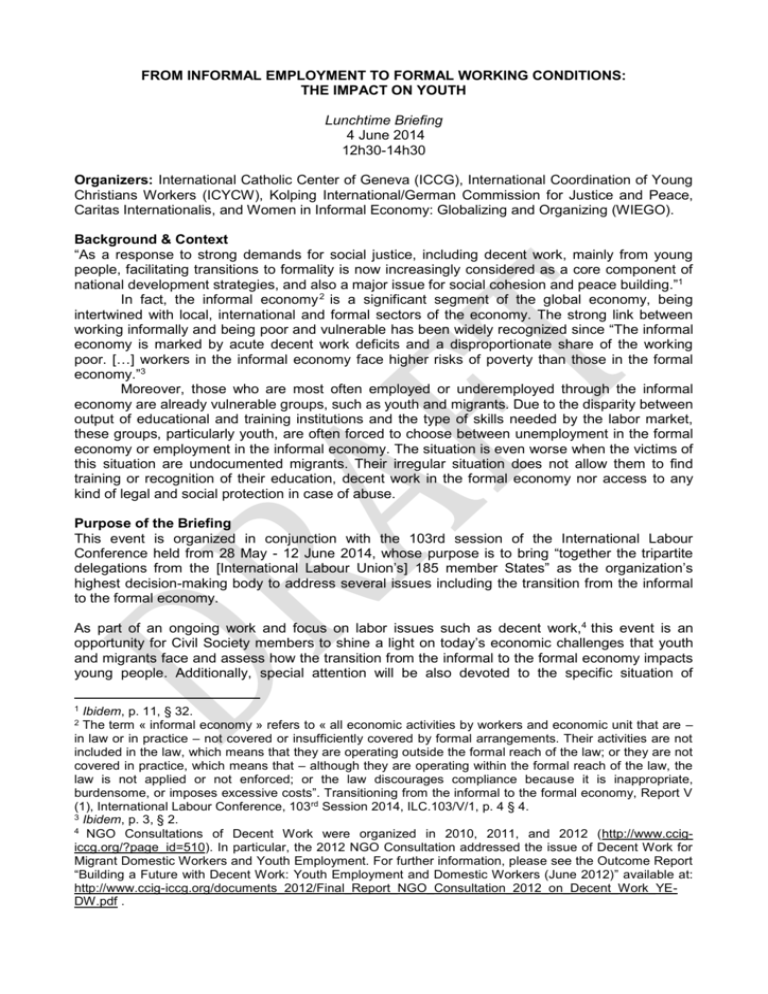
FROM INFORMAL EMPLOYMENT TO FORMAL WORKING CONDITIONS: THE IMPACT ON YOUTH Lunchtime Briefing 4 June 2014 12h30-14h30 Organizers: International Catholic Center of Geneva (ICCG), International Coordination of Young Christians Workers (ICYCW), Kolping International/German Commission for Justice and Peace, Caritas Internationalis, and Women in Informal Economy: Globalizing and Organizing (WIEGO). Background & Context “As a response to strong demands for social justice, including decent work, mainly from young people, facilitating transitions to formality is now increasingly considered as a core component of national development strategies, and also a major issue for social cohesion and peace building.”1 In fact, the informal economy 2 is a significant segment of the global economy, being intertwined with local, international and formal sectors of the economy. The strong link between working informally and being poor and vulnerable has been widely recognized since “The informal economy is marked by acute decent work deficits and a disproportionate share of the working poor. […] workers in the informal economy face higher risks of poverty than those in the formal economy.”3 Moreover, those who are most often employed or underemployed through the informal economy are already vulnerable groups, such as youth and migrants. Due to the disparity between output of educational and training institutions and the type of skills needed by the labor market, these groups, particularly youth, are often forced to choose between unemployment in the formal economy or employment in the informal economy. The situation is even worse when the victims of this situation are undocumented migrants. Their irregular situation does not allow them to find training or recognition of their education, decent work in the formal economy nor access to any kind of legal and social protection in case of abuse. Purpose of the Briefing This event is organized in conjunction with the 103rd session of the International Labour Conference held from 28 May - 12 June 2014, whose purpose is to bring “together the tripartite delegations from the [International Labour Union’s] 185 member States” as the organization’s highest decision-making body to address several issues including the transition from the informal to the formal economy. As part of an ongoing work and focus on labor issues such as decent work,4 this event is an opportunity for Civil Society members to shine a light on today’s economic challenges that youth and migrants face and assess how the transition from the informal to the formal economy impacts young people. Additionally, special attention will be also devoted to the specific situation of 1 Ibidem, p. 11, § 32. The term « informal economy » refers to « all economic activities by workers and economic unit that are – in law or in practice – not covered or insufficiently covered by formal arrangements. Their activities are not included in the law, which means that they are operating outside the formal reach of the law; or they are not covered in practice, which means that – although they are operating within the formal reach of the law, the law is not applied or not enforced; or the law discourages compliance because it is inappropriate, burdensome, or imposes excessive costs”. Transitioning from the informal to the formal economy, Report V (1), International Labour Conference, 103rd Session 2014, ILC.103/V/1, p. 4 § 4. 3 Ibidem, p. 3, § 2. 4 NGO Consultations of Decent Work were organized in 2010, 2011, and 2012 (http://www.ccigiccg.org/?page_id=510). In particular, the 2012 NGO Consultation addressed the issue of Decent Work for Migrant Domestic Workers and Youth Employment. For further information, please see the Outcome Report “Building a Future with Decent Work: Youth Employment and Domestic Workers (June 2012)” available at: http://www.ccig-iccg.org/documents_2012/Final_Report_NGO_Consultation_2012_on_Decent_Work_YEDW.pdf . 2 (young) migrants, who are often more exposed to the risk of abuse due to their automatic exclusion from the formal labor market and fundamental labor rights. The event will bring together economic experts and those affected by the informal economy, youth employment as well as those dedicated to creating institutional changes to protect vulnerable workers. This briefing is an opportunity to identify windows of opportunity for Civil Society organizations that may be interested in the topic of youth employment from various perspectives as well as to draw to the attention of international organizations the local perspective, allowing a better understanding of initiatives occurring on both local and international levels. The aim of the briefing is to help structure the dialogue regarding the transition from the informal to formal economy, specifically influencing the emphasis of key issues at both the international and local levels, such as poverty, education, migration and socioeconomic rights. Additionally networking between actors in regard to informal economy and youth employment is advisable as the negotiations on the expected ILO- recommendation on transition of informal economy to formal economy is going on in 2014/2015. Date/Time: 4 June 2014 - 12h30-14h30 Venue: Conference room – ground floor - rue de Varembé 1 (Tentative) Welcome: CCIG Keynote Speaker: ILO representative from the Youth Employment Program and other relevant units Expected Participants: Social Partners representatives (e.g. trade union and employers’ representatives) NGO contact at ILO WIEGO (Think-tank on gender issues and informal economy) Youth representative of CIJOC Representative of Caritas Jordan Representatives of Civil Society Organizations Moderation: Kolping international/German Commission for Justice and Peace

